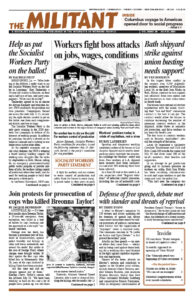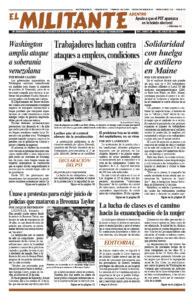A letter to Harper’s magazine by 150 writers and artists speaking out for freedom of speech and debate came under immediate attack by radical purveyors of political correctness who believe that the suppression of “improper” views is required today. The venomous reaction to “A Letter on Justice and Open Debate,” in fact proved the writers’ point.
Attacks on free speech — no matter where they come from — always end up being used against those looking for a working-class road forward in the fight against capitalist exploitation and oppression.
Signers of the letter, already on Harper’s website and scheduled to appear in the October print edition, include feminist Gloria Steinem, novelist Salman Rushdie, jazz musician Wynton Marsalis, liberal New York Times columnist Michelle Goldberg and conservative Francis Fukuyama. After an obligatory condemnation of President Donald Trump’s “threat to democracy,” the writers point out that “the free exchange of information and ideas, the lifeblood of a liberal society, is daily becoming more constricted.”
They also point to “an intolerance of opposing views, a vogue for public shaming and ostracism and the tendency to dissolve complex policy issues into a blinding moral certainty.”
Harper’s will simultaneously print a counterattack on the “Letter on Justice.” That one is signed by some 160 members of what is called the “publishing community.”
The counterstatement race-baits the letter’s signers, saying many of them are “white, wealthy, and endowed with massive platforms” and “privileged,” as if the color of your skin, accident of birth or commercial success predetermines if your views are correct or not. The counterstatement charges that free speech and open debate are “seductive but nebulous concepts and coded language” that are being used to keep “marginalized voices” from having a “platform.”
Never mind that the letter was spearheaded by Thomas Chatterton Williams, a writer who is Black, as are many of the signers.
The counterstatement backers are especially irked that the letter is signed by J.K. Rowling, author of the Harry Potter series. Rowling has come under increasing attack for her feminist views, aimed at destroying her career and livelihood.
The counterstatement signers falsely charge Rowling with “platforming violent anti-trans speakers,” because she spoke out in defense of Maya Forstater, a woman in the U.K. who was fired for stating that there are two sexes, determined by biology. A special target of those pushing the suppression of views is to prevent workers and youth from seeing class battles as the driving force of history and from seeing how working-class consciousness advances through our struggles.
Vox staff writer Emily VanDerWerff complained to the website’s editors that the signature of fellow staff writer Matthew Yglesias on the Letter on Justice “makes me feel less safe at Vox” — a prod to the bosses to go after him.
Attacks from free speech opponents
These are not hypothetical threats. In early June New York Times editorial page editor James Bennet was forced to resign for running a column by Republican Sen. Tom Cotton that fell foul of the strictures imposed by liberals who manage the paper.
Last month Henry Bienen and Willard Bunn, president and board chairman of the Poet’s Foundation, were forced to resign for issuing a short note expressing “solidarity with the Black community” after cops killed George Floyd in Minneapolis. Some 1,800 “poets,” “readers,” “award recipients” and others signed a statement charging that “the watery vagaries of this statement are, ultimately, a violence” against Blacks.
Workers and our unions need to fight tenaciously whenever bosses — or the political correctness police — use thought control measures to throw any worker out of a job, regardless of whether we agree with their opinions. As the class struggle heats up, bosses will increasingly try to muzzle militant workers for speaking out about the impact of the capitalist crisis on our lives — as they have done in the past.
Working people and youth have a right to consider competing viewpoints, to think for ourselves and express our own views without being threatened with losing our livelihoods by those who claim they know what is in our best interest. We need to jealously guard the right to free speech because we need more discussion and debate, not less, to forge political clarity on the way forward to strengthen the unity and fighting capacity of the working class.

